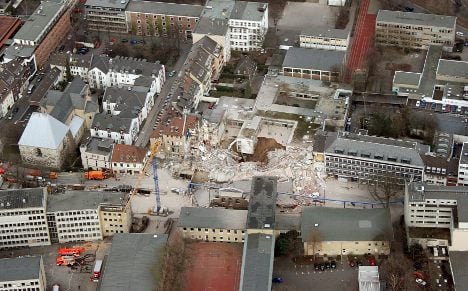Cologne city authorities were forced to repeat assurances there was no danger of further collapses as tens of thousands of Karneval revellers gather in the city this weekend.
City director Guido Kahlen said the big days of celebration on Sunday and Monday could “without doubt” go ahead.
But the Kölner Stadt-Anzeiger daily cited experts who did not rule out that the underground excavations could become unstable if the Rhine River level rose to more than four metres because of heavy snowmelt.
The paper reported that too little concrete may have been used on the tunnel under the Waidmarkt area – a possible reason for collapse of the tunnel that led to the destruction of the city’s historical archive in March 2009 and two neighbouring buildings, killing two people.
North Rhine-Westphalia Building and Transport Minister Lutz Lienenkämper talked of “highly criminal actions” and demanded immediate explanations.
On Thursday, examinations had shown that at the site of the Heumarkt U-Bahn, only 17 percent of the plates meant for the supporting wall had been used. These plates were needed to stabilise the structure, the Kölner Stadt-Anzeiger reported.
According to the paper, assessors from the state prosecutor’s office believe a leak into the fitted plate 11, directly beneath the archives building, flowed from groundwater in an excavation pit.
The breach could have arisen because the 3.4 metre wide shovel for digging the plate to a depth of 30 metres was damaged on an obstruction, meaning a 2.8 metre wide digging tool was substituted.
The report said a further 22 plates were installed based on incorrect surveying procedures.
On Friday, news magazine Der Spiegel reported that Cologne officials prepared evacuation plans for the Waidmarkt area last month due to safety concerns. Only after further testing did they decided against emptying a large swath of the city.



 Please whitelist us to continue reading.
Please whitelist us to continue reading.
Member comments